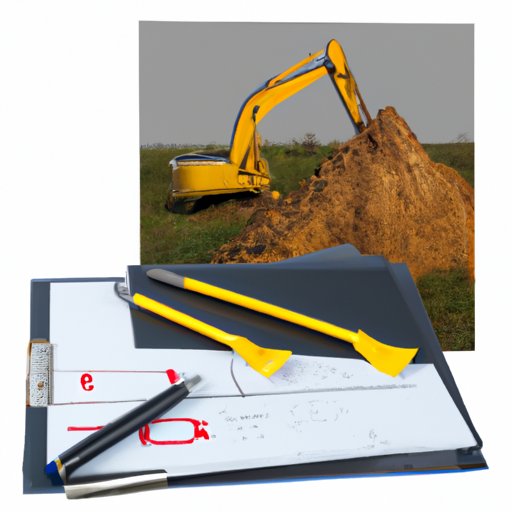Introduction
Excavation businesses provide essential services to many industries, such as construction, mining, demolition, and more. Starting an excavation business can be a profitable venture, but it requires careful planning, research, and dedication to succeed. In this article, we’ll explore how to start an excavation business, outlining the steps to get started, listing the necessary equipment, discussing licensing and insurance requirements, and sharing tips on how to market the business.
Overview of Excavation Businesses
An excavation business is a type of construction service that involves digging, moving, or otherwise altering land. Excavation businesses are typically hired for projects that require clearing, grading, or other earth-moving activities. Some common projects include constructing foundations, installing drainage systems, preparing sites for construction, and demolishing structures. Excavation businesses may also specialize in specific tasks, such as trenching, backfilling, or road building.
Benefits of Starting an Excavation Business
Starting an excavation business has several benefits. First, it provides a steady stream of income, as excavation services are always in demand. Second, it allows you to work with your hands and build something tangible. Third, it offers the potential for growth, as you can expand into new markets and hire additional personnel if needed. Finally, it gives you the opportunity to work outdoors and enjoy the rewards of hard work.

Outline the Steps for Starting an Excavation Business
Before you can begin operating an excavation business, there are several steps you must take. These include researching the market, establishing a business plan, obtaining licensing and insurance requirements, sourcing supplies and equipment, hiring employees, and developing safety protocols.
Research the Market and Establish a Business Plan
The first step in starting an excavation business is to do some research. Look at the local market and identify who your competition is. This will help you determine your pricing, target audience, and services you offer. Next, create a business plan that outlines your goals, budget, timeline, and strategies for success. The business plan should also include a budget for equipment and supplies, marketing, and staffing.
Obtain Licensing/Insurance Requirements
Once you have established a business plan, you will need to obtain the necessary licensing and insurance requirements. Depending on where you live, you may need to obtain a contractor’s license and liability insurance. Additionally, you may be required to carry worker’s compensation insurance for any employees you hire. Contact your local government office to learn about the specific licensing and insurance requirements for your area.
Source Supplies & Equipment
The next step is to source the necessary supplies and equipment for your business. You will need to purchase or rent heavy machinery, specialized tools, and safety gear. You may also need to invest in additional materials, such as fuel, lubricants, and spare parts. Take the time to shop around and compare prices to ensure you are getting the best deal.
Hire Employees
If you plan to operate a large excavation business, you will need to hire employees. Consider your staffing needs and create job descriptions for each position. To find qualified candidates, post job listings online and attend local job fairs. When interviewing potential employees, make sure to ask questions about their experience and qualifications.
Develop Safety Protocols
Safety is paramount when operating an excavation business. Before beginning any project, develop a comprehensive safety plan that outlines the procedures for handling hazardous materials, operating equipment, preventing accidents, and responding to emergencies. All employees should be trained on these protocols and updated regularly.
Identify the Equipment Needed to Operate an Excavation Business
The equipment needed to operate an excavation business depends on the size and scope of the projects you plan to undertake. At a minimum, you will need heavy machinery, specialized tools, and safety gear. Common pieces of equipment include excavators, bulldozers, loaders, dump trucks, trenchers, backhoes, and compaction machines.

Discuss the Licensing and Insurance Requirements for an Excavation Business
Depending on where you live, you may need to obtain a contractor’s license and liability insurance before you can begin operating an excavation business. Contractor’s licenses are issued by state governments and may require a background check and proof of experience. Liability insurance covers any damages resulting from your operations, while worker’s compensation insurance covers medical expenses for injured employees.
Highlight the Best Practices for Safety in an Excavation Business
Safety should be a top priority in any excavation business. To ensure a safe work environment, establish training programs for all employees, identify and address hazards, and develop site-specific safety plans. Additionally, implement safety protocols for operating equipment, handling hazardous materials, and responding to emergencies.

Share Tips on How to Market an Excavation Business
Marketing is key to the success of any excavation business. Leverage online platforms, such as social media and review sites, to build brand awareness. Network with local contractors and attend industry events to meet potential clients. Develop a unique brand identity, such as a logo or tagline, to differentiate your business from competitors.
Conclusion
Starting an excavation business requires research, planning, and dedication. To get started, outline the steps for starting a business, identify the equipment needed to operate, understand the licensing and insurance requirements, and highlight the best practices for safety. Additionally, use various marketing tactics to reach potential clients. With the right preparation, you can launch a successful excavation business.
(Note: Is this article not meeting your expectations? Do you have knowledge or insights to share? Unlock new opportunities and expand your reach by joining our authors team. Click Registration to join us and share your expertise with our readers.)
